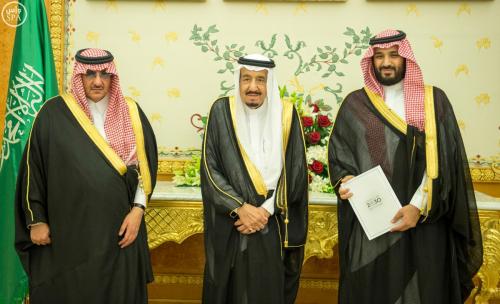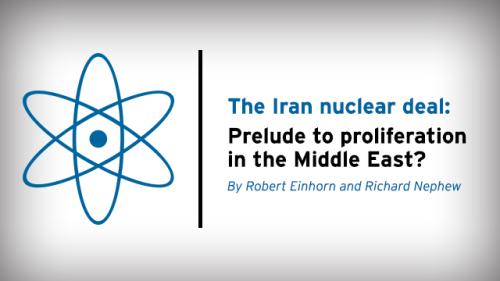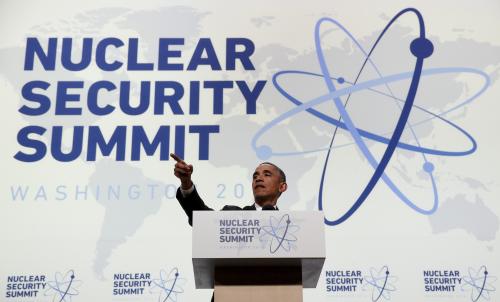Given Hassan Rouhani’s experience as Iran’s lead nuclear negotiator from 2003 to 2005, a time that saw a temporary suspension of uranium enrichment, there has been a great deal of discussion in the Iranian media of what his victory means for the future of the nuclear negotiations. While many pieces note that all of his actions will have to be undertaken in consultation with Supreme Leader Ali Khamenei, desire for change in Iran’s negotiating personnel and tactics has been expressed across various outlets. In an interview, MP and deputy head of the Majlis National Security and Foreign Policy Committee Ahmad-Reza Dastgheib said, “The negotiating team has to change,” and also suggested a more comprehensive approach under Rouhani, in which cabinet members like the foreign minister take an active role in the negotiating process. In the reformist Shargh, Farangis Bayat wrote of hopes that Rouhani would bring professionalism and a sense of transparency to the negotiations, in contrast to the Ahmadinejad era, when, as she put it, “[Saeed] Jalili conducted the negotiations as political advertisement.” In the capstone of a series of articles on the issue in Tehran-e Emrooz, Maryam Salari wrote that many analysts see Rouhani’s victory as a vote for a different negotiating stance, reporting, “One view is that the definitive result of the presidential election can be considered a protest response to the nuclear decision-making of the negotiating team which led to unprecedented sanctions against Iran.”
Tactical suggestions have also been made in the press. Although most commentators have stopped well short of suggesting a concrete list of figures Rouhani should name to his negotiating team, many have called for technical and tactical experts to be given precedence over political appointments. In the same Tehran-e Emrooz series, Hassan Beheshtipour suggested that Rouhani begin by revisiting the deal that Iran rejected at the most recent round of talks at Almaty, which would have halted some enrichment activities in exchange for relief on precious metal sanctions. He added that Rouhani had to work hard and transparently at the negotiating table to undo the distrust that the Iranian people had built up for the West. Ali Bigdeli suggested that Rouhani should take advantage of recent positive comments from the European Union: “In the next stage, Mr. Rouhani should go to Europe to meet with officials on the nuclear issue and strive for transparency in the process.” Parviz Mojtahedzadeh, meanwhile, suggested he take a more patient approach, waiting to gauge the course of the upcoming phase of talks before making grand gestures on behalf of Iran. The daily Ebtekar also suggested that if reports of a possible round of talks with the IAEA shortly after Rouhani’s inauguration in August are realized, Iran take them seriously in order to earn a positive report from the agency and set a good tone for negotiations with the P5+1. However, some conservatives have suggested that any progress is nearly impossible, and that this is the fault of the United States. In Khorasan, Seyyed Hamid Hosseini argued that the recent increase in sanctions in spite of Rouhani’s victory means that those in Washington who see the electoral result as a sign that Iranians want a more conciliatory approach to the negotiations to deflect pressure think that even more pressure will make Iran even more conciliatory. This belief, he argues, will backfire, as it will make Iran resistant to opening a new chapter in talks.
There has been interest in what commentators have been writing about the outlook for nuclear negotiations in the global English-language press, too. The Persian-language site Strategic Review ran a translated version of new Brookings senior fellow and former high-level State Department official Robert Einhorn’s new piece in Foreign Policy, a piece covered previously on this blog by Suzanne Maloney. Meanwhile, there has been widespread coverage as well of the piece written by Seyed Hossein Mousavian, the former member and spokesman of Iran’s negotiating team during Rouhani’s tenure as chief negotiator, in the Cairo Review (and picked up in the Iranian press via its condensed version in Asharq Al-Awsat). Highlighting the writer’s close ties to the president-elect, outlets including Kayhan and Tabnak covered Mousavian’s analysis of Iran’s nuclear policy options and, in particular, his assertion that the prescriptions of the Non-Proliferation Treaty has been so unfairly manipulated against Iran over the course of the past decade that it may be in Tehran’s interest to leave the NPT altogether.
APPENDIX: Translated Summaries of Selected Opinion Pieces (Newest to Oldest)
“Twofold Views on the Next Stage of the Nuclear Issue.” Maryam Salari, Tehran-e Emrooz, 18 Tir 1392 / 9 July 2013.
In a lengthy analysis followed by three commentaries (see below), Salari discusses various forecasts for the next phase of the nuclear dispute in the moderate Tehran-e Emrooz. She discusses certain experts’ opinions that there is a recognized need for Iran to undo the damage of eight years of increased tension with the West. As she put it, “One view is that the definitive result of the presidential election can be considered a protest response to the nuclear decision-making of the negotiating team which led to unprecedented sanctions against Iran.” However, she notes that many in the West see Iran in a set of unfavorable circumstances that recall the year 1988, when Iran was forced to accept a ceasefire to end the Iran-Iraq War that it had long rejected. Now, she writes, Rouhani must deal with the question of relations with the West as Iran had to deal with the issue of the ceasefire in 1988, and seek to avoid unfavorable terms. However, she notes hopeful signs from the West, such as portrayals in media sources like the Washington Post of Rouhani as a highly reputed diplomat with a track record of defusing tension – although there have been dissenting opinions arguing that Rouhani’s main goal during his tenure as head negotiator was simply to avoid having Iran’s case referred to the UN Security Council. Salari also notes that Rouhani has stated a primary goal of his is to increase the transparency of the Iranian nuclear program, so we can expect him to make efforts on this front. She also emphasizes that he called for the negotiations to be conducted more seriously: “He also said in the course of the electoral debates that the level of the negotiations must be upgraded to the level of cabinet ministers and presidents.” Thus, she writes, it is expected that the new president will take a very hands-on approach: “Experts believe it is inevitable that Rouhani will direct his own attention toward solving the nuclear issue.”
“New Proposals Should Not Be Made.” Parviz Mojtahedzadeh, Tehran-e Emrooz, 18 Tir 1392 / 9 July 2013.
In a companion commentary, Professor Mojtahedzadeh writes that Rouhani should take a patient approach upon his inauguration and should avoid being too eager in making proposals – rather, he should wait to establish the pattern of the new round of talks before trying to make grand gestures. Mojtahedzadeh also emphasizes that it is crucial that Rouhani avoid political appointment and instead choose as a head negotiator a figure with tactical experience who “entirely understands the other side’s culture and knows how to counter them.”
“Reviving a Proposal.” Hassan Beheshtipour, Tehran-e Emrooz, 18 Tir 1392 / 9 July 2013.
In a companion commentary, analyst Beheshtipour suggests Iran should begin by revisiting the last proposal of the P5+1 at the most recent round of talks in Almaty, which would entail a six-month suspension of the Fordo facility, a suspension of 20% enrichment, and an allowance for the continued oxidation of the 20% enriched stockpile for use as fuel plates, in exchange for a suspension of precious-metal sanctions. He also agrees that one of the first priorities of the new government will be to strengthen the negotiating team, but also emphasizes that the expert-level work done on the active front of the nuclear negotiations should be complemented with public statements to increase transparency and trust. “In truth, Mr. Rouhani must take the sense that has become instilled in the nation, that the West cannot be trusted, and fix it at the negotiating table through innovative plans.”
“Review of Relations With Europe.” Ali Bigdeli, Tehran-e Emrooz, 18 Tir 1392 / 9 July 2013.
In a companion commentary, Professor Bigdeli discusses comments made by European Union officials allowing for a window for new progress in its discussions with Iran over the nuclear program. He argues that this allows Iran an opportunity in two ways: “First, the EU is more interested in finding a solution to the [nuclear] problem because we, traditionally, have had cultural, economic, and social ties and this is a chance for us to redevelop those ties; Second, it is an opportunity for us to seek a solution tin a relatively domestic way.” He also argues that finding a solution to the dispute can be easy if various factions do not obstruct the path. “In the next stage, Mr. Rouhani should go to Europe to meet with officials on the nuclear issue and strive for transparency in the process.” Bigdeli cites Rouhani’s past experience and his “calmer tone” as being valuable assets likely to make progress with Europeans easy.
“Possibility of Imminent Meetings of the IAEA with Tehran.” Ebtekar, 18 Tir 1392 / 9 July 2013.
The daily Ebtekar writes that reports out of Vienna, suggesting that there may be a desire for a meeting between the IAEA and Iranian officials in August, showed that even as the P5+1 discusses its approach to dealing with an Iran under Rouhani, the agency may be looking to preempt such talks by first dealing gauging any changes in Iran’s willingness to show transparency. Noting the particular tension that Tehran has had with the IAEA over the Parchin site, the daily suggests a constructive meeting with Yukiya Amano’s staff could go a long way toward improving the prospects for a new era of negotiations with the West. “The tone of a new IAEA report can play a role in determining the future course of negotiations with Iran,” it wrote.
“The Future of Nuclear Diplomacy.” Farangis Bayat, Shargh, 15 Tir 1392 / 6 July 2013.
Arguing in the reformist daily Shargh that the negotiating style of Iran under two Ahmadinejad administrations left Iran in a far weaker position vis-à-vis the West in nuclear negotiations, Bayat writes that Rouhani’s experience, knowledge, and diplomatic tact portend a swift change ahead for Iran’s fortunes in the negotiations. “It appears that this new set of circumstances is cause for a great strengthening of the power of the [Islamic Republic] system,” she writes. Bayat also insists that a major area for hope is the fact that many Western diplomats have experience working with Rouhani and know his style, which she adds is very different from that of Saeed Jalili. “Jalili conducted the negotiations as political advertisement,” she writes. She also adds that Rouhani is expected to bring his experience and his adherence to diplomatic principles to achieve a greater sense of transparency – this is emphasized as one of his top strengths and priorities – for the Iranian nuclear program. In this way, she argues, he can facilitate a “win-win” agreement rather than one in which Iran capitulates to terms presented by its negotiating partners. “It could distance us from the common view that we will see a type of ‘ceasefire’ agreement like the ceasefire that ended the Iran-Iraq War,” she emphasizes.
“Obama’s First Negative Pulse to Rouhani.” Seyyed Hamid Hosseini, Khorasan, 15 Tir 1392 / 6 July 2013.
In the conservative daily Khorasan, Hosseini writes that a new round of sanctions that took effect early this month are a sign of American policy intransigence and will severely damage the hope that the election of Rouhani will have an effect on the nuclear negotiation process. He says that although they are the result of a bill signed in January, “They were, without a doubt, timed to take effect at the time of the presidential election.” He argues that many thought the United States could have altered course given Rouhani’s victory, which took Washington by surprise. Yet, he says, the results of the election only emboldened many policymakers in Washington, as they see the Iranian choice of a different kind of president as a response to the effects of international pressure. It follows, in the logic of such thinkers – he cites Dennis Ross as an example – that if pressure made Iran elect a more conciliatory president, it will make Iran more conciliatory in negotiations. Hosseini says this group of thinkers have, in the recent sanctions decision, won the policy battle over those who think offers of sanctions relief can bring about more fruitful negotiations, like former senior State Department official Vali Nasr and the National Iranian American Council. Hosseini writes that Rouhani has made one of his first priorities preventing the enacting of new sanctions, and thus the move is a slap in the face to the president before he can take office. It will backfire, he argues – although the Obama administration believes pressure will bring Iran back to the table in a weaker position, the concept of “negotiations under pressure” is aggressive and disrespectful, and will not only fail to open the dead-end road of the nuclear negotiations but will make any progress more complicated.



Commentary
Iran Press Report: The Outlook for Nuclear Negotiations Under Rouhani
July 12, 2013